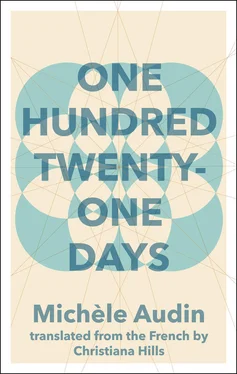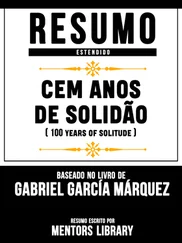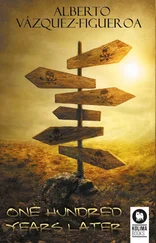It was a Tuesday; the seminar was always on Tuesdays. At the end of the month of May, if I remember correctly. I should be able to find the exact date for you, if you’re interested. It was a beautiful late afternoon, almost a summer evening, that I can remember. So they went in the café, where there was another group of professors, historians, already sitting at a table with their steins of beer. It was the closest café to the Palais Universitaire, you always saw lots of professors there. I think it still exists. How well do you know Strasbourg?
In any case, this café wasn’t displaying the notorious “Forbidden to Jews” sign. They all ordered beers. André told me that Kürz had mainly talked about his life, with a bit of complacency and not much tact. He said he had enlisted in the navy at age seventeen and had been very happy to wage war. This was the war of ’14. That experience had been beneficial for his health and had taught him a lot. To say this to a group of Frenchmen, in Strasbourg, in 1939, was rather provocative. André found it all very tiresome. Kürz told them about his trip to Paris, and how there had been lots of people who came to listen to his lectures. He spoke of the way peace and Franco-German friendship had been celebrated in a walk with Professor Motfraus in the Jardin des Tuileries. Kürz even went as far as to proclaim how happy he was, as a German, to find himself here in Strasbourg. While gesturing to the Palais Universitaire, a Wilhelminian building, through the café windows, he said, “You French cannot understand — this is the true German spirit.” And he added: “We will return.” The atmosphere was tense, André told me. At the table next to them, the historians went quiet. The mathematicians didn’t say a word, out of politeness or embarrassment, and that had irritated André a little. But, as a student invited to a table of professors, what could he do?
He had described all this to me rather gravely, but it made him laugh as well. André was like that. Very serious and very funny at the same time.
He was my friend.

André had a great sense of humor. I think he was rather pleased with himself that day. He had quite simply asked a mathematical question. Quite simply, he repeated to me. A real, serious question. But in French. Politely, but in a loud, clear voice. Over at the table of historians, he saw the one facing him smile slightly. Kürz thought for a moment, shook his head, and gave his answer: “Ich weiss nicht,” I don’t know, in German. “I might know,” André said, and he added politely, in French: “I should like to write to you, Professor. I will send you my proof as soon as I’ve worked out the details.” After which, they all got up, I guess Pariset was the one who paid the bill, and they parted ways.
Would you like more coffee?

I’m sure you know the name Daniel Roth. Yes, he was one of your colleagues, a historian. But he was interested in the Renaissance. You may also have heard of Marcel Schmitt. Yes? Of course, you know all the historians. He was a professor at the University of Strasbourg as well. He wrote a little book about his memories, he talks about Roth in it. You’ve read it? Why am I talking about Roth? Because he and Schmitt were among the group of historians at the café. The one who smiled at hearing André speak French, that was Roth. The historian with the smile, André had said to me. He was smiling, too, when he told me about it. Daniel Roth caught up with him, in front of the statue of Goethe, right in front of the university, and congratulated him on his question. They walked together for a little while. André was in awe; as you know, at that time, relationships between professors and students were rather distant. Roth was already quite famous, and André was just a student. Yet Roth knew André’s name. He had heard about our raid on the bookstore, only because Doctor Sonntag was his cousin and had told him about it. André tried to explain the question he had asked Kürz. But the great man knew nothing about class field theory, which really made André laugh. And then they spoke about hell, and the situation in Germany.
In Strasbourg, we were very close to Germany; there were a lot of German refugees, so we knew what was going on. In particular, as students, we had heard people talking about what was happening within the universities. Living one day at a time, the anxiety whenever a political topic came up in conversation, the Horst-Wessel-Lied sung in unison with one arm raised, Party membership, the class boycotts, the dismissal of undesirables. Yes, of course, you know all that, that’s your job. You’ll know this as well: in 1939, there was no doubt about it, we knew there would be war. Like André, like us all, Roth knew that the German had been right and that they were going to return, like he had said, to take back their square kilometers of vital space, and that they would do here what they had already done there.
Roth and André parted and went their separate ways, each to his own abode.
The next morning, Daniel Roth had a copy of Dante’s Inferno brought to André. He had dedicated and signed the book. André was very proud of it. He brought it to the library to show me. Later on, he lent it to one of his friends, right before he was arrested. It’s too bad you couldn’t have met Mireille Duvivier. I’ll tell you her story another time.
Now I’m the one who owns the book. I’m going to show you the dedication.
Look what Daniel Roth wrote: “Absurd or not, make no mistake, the hell they’re preparing for us is very well organized.”
CHAPTER V. Journal of Heinrich Kürz 1
The mathematician and German officer Heinrich Kürz (1897–1965) kept this journal during one of his stays in Paris, then carefully typed it up. This is a translation of the journal with annotations and commentary. The document (fifteen typed pages) can be found in the Kürz Collection in the University of N. Archives. Dr. Hermann Raffke, the curator of the archives, and Dr. Bernhardt Hermann, grandson of Heinrich Kürz, gave their permission for this publication. I would like to take this opportunity to thank them.
(PARIS, 1942)
Very well organized, my trip. Left for Paris at midnight on May 28. 2Unfortunately could not stop by Neuenbach to kiss Lotte and her mother. In the train compartment, spoke with a lieutenant who was returning from the Eastern front. Described the losses suffered. Amputations of frozen limbs. Thought of Otto Zach. 3What a loss it would be, for science and for Germany, if he didn’t come back. At least he will have done what he wanted to do, right to the end.
The goal of Kürz’s trip was to look for French mathematicians who would agree to contribute articles to the German mathematical review journal..
At the request of Dr. Hermann and out of consideration for potential beneficiaries, the majority of the names of the people mentioned here have been changed. The name of Otto Zach used here designates a young mathematician (1913–1943) who was both a brilliant academic and a very active member of the National Socialist Party.
May 29, 1942
In Paris, at the Hotel Raphael, between the Arc de Triomphe and the Trocadéro. Beautiful room. Antique woodwork. 4Met Jünger, the famous writer and hero of the Great War, who is staying in the next room over and wanted to know what a mathematician like me was doing in Paris working as a member of the occupation forces. Explained to him how a review journal works and our need for contributions from French mathematicians. Walked together from the Trocadéro to the Étoile and back. Had a beer together on a café terrace. Atmosphere was cheerful and Parisian. “So, you’re a salesman for German science,” he said to me.
Читать дальше













